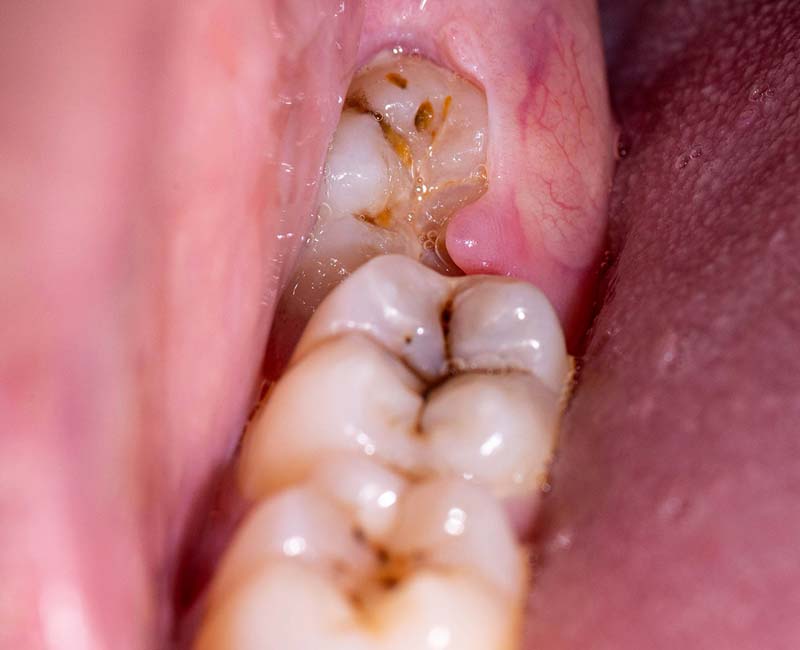Impacted wisdom teeth happen when your third molars become partially or fully trapped in your gums or jawbone. This can lead to a number of oral health problems, including infection, tooth decay and gum disease. Surgical removal is often recommended as treatment for impacted wisdom teeth.
Advertisement
Cleveland Clinic is a non-profit academic medical center. Advertising on our site helps support our mission. We do not endorse non-Cleveland Clinic products or services. Policy

Image content: This image is available to view online.
View image online (https://my.clevelandclinic.org/-/scassets/Images/org/health/articles/22296-impacted-wisdom-teeth)
Wisdom teeth — also called third molars — are the last set of teeth that grow in. They usually erupt (break through your gums) between the ages of 17 and 25. Sometimes, wisdom teeth erupt in alignment with your other teeth and don’t cause any problems. Other times, they become either partially or fully trapped in your gums or jawbone. This is referred to as impaction. Impacted wisdom teeth can cause a variety of oral health problems, including cavities, gum disease and infection.
Advertisement
Cleveland Clinic is a non-profit academic medical center. Advertising on our site helps support our mission. We do not endorse non-Cleveland Clinic products or services. Policy
Fully impacted wisdom teeth aren’t visible. They’re completely hidden underneath your gums. A partially impacted wisdom tooth is slightly visible because part of it has erupted. Non-impacted wisdom teeth have erupted and are completely visible above your gum line. It’s important to note that non-impacted wisdom teeth can still cause problems.
You might hear your dentist use the terms “soft tissue impaction” and “hard tissue impaction.” Soft tissue impaction means your tooth has erupted from your jawbone but hasn’t broken through your gums. Hard tissue impaction means your tooth is still completely covered by your gums and jawbone.
There are four types of impacted wisdom teeth. Each type matches with the positioning of your tooth:
Advertisement
Impacted wisdom teeth are extremely common. According to the American Academy of Oral and Maxillofacial Surgeons, 90% of people have at least one impacted wisdom tooth.
Impacted wisdom teeth can cause pain, infection and damage to other teeth. Wisdom teeth are also difficult to clean. As a result, they’re more prone to tooth decay and gum disease.
Yes. In some cases, impacted wisdom teeth can cause radiating pain in your jaw, face and head.
Sometimes, impacted wisdom teeth don’t cause any noticeable problems. Other times, symptoms may develop suddenly or gradually over time. Signs of impacted wisdom teeth include:
Wisdom teeth usually become impacted when your jaw doesn’t have enough space to accommodate your teeth. Sometimes, a tooth may erupt at the wrong angle, which can lead to impaction.
Your dentist will perform an examination and ask you about your symptoms. They’ll also take dental X-rays to see if your teeth are impacted and if your jawbone or other teeth are damaged.
If your impacted teeth are causing pain, infection or other dental damage, wisdom teeth removal is usually recommended. Many dentists recommend this oral surgery procedure as a preventative measure to reduce the risk of problems in the future.
While impacted wisdom teeth are generally more difficult to remove, the process isn’t necessarily more painful. Your dentist or oral surgeon will give you pain relievers to manage any post-operative (after surgery) discomfort.
Like any surgical procedure, wisdom teeth removal comes with some potential risks and complications, including:
Most people fully recover from wisdom teeth removal in one to two weeks. In most cases, you can return to work, school and other normal routines in just a few days.
Advertisement
If your wisdom teeth are impacted but aren’t causing any problems, you probably don’t need to remove them. However, if you start developing symptoms, removing them can reduce your risk of other issues and improve your overall oral health.
If your impacted wisdom teeth are causing pain and other symptoms, leaving them in place can be bad for your oral health. Impacted wisdom teeth are more prone to infection and abscesses — and they can cause damage, decay and disease to healthy teeth.
While you can’t prevent impacted wisdom teeth, you can reduce the risk for the problems they cause. Practice good oral hygiene and consider having your wisdom teeth removed at a younger age if they start causing problems.
If you have pain or other symptoms affecting the area behind your last molar, schedule an appointment with your dentist. They can determine if your issues are due to impacted wisdom teeth.
Impacted wisdom teeth can cause a wide range of symptoms, including swelling, bad taste and pain that radiates throughout your jaw and face. Wisdom teeth removal is a common oral surgery procedure that can ease your symptoms and reduce the risk of future oral health problems. Talk with your dentist about whether this treatment is right for you.
Advertisement

Sign up for our Health Essentials emails for expert guidance on nutrition, fitness, sleep, skin care and more.
Learn more about the Health Library and our editorial process.
Cleveland Clinic’s health articles are based on evidence-backed information and review by medical professionals to ensure accuracy, reliability and up-to-date clinical standards.
Cleveland Clinic’s health articles are based on evidence-backed information and review by medical professionals to ensure accuracy, reliability and up-to-date clinical standards.
Get the care you need today! At Cleveland Clinic, we offer specialty care that’s focused on you.
